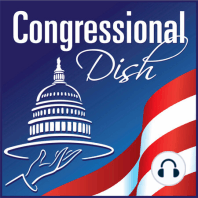70 min listen
CD038: Wasting July
ratings:
Length:
32 minutes
Released:
Aug 9, 2013
Format:
Podcast episode
Description
In this episode, we catch up on most of the bills that passed the House during the last two weeks of August. A lot of bills were passed; very few have a prayer of becoming law. Intro and Exit Music: Tired of Being Lied To by David Ippolito (found on Music Alley by mevio) S. 622: The Animal Drug Bill Is now law Covered in detail in the second half of episode CD030 Continues a system designed to expedite the approval of anti-biotics for animals Caps revenues from application fees paid by pharmaceutical companies Music: Don't Waste My Time by Planet Killers (found on Music Alley by mevio) H.R. 1911: The Student Loan Bill Has been amended by the Senate, passed the House again on July 31, and is now on the President's desk Original version covered in episode CD029 Now ties student loan interest loan rates to the market and caps rates at 8.25% for undergraduates and 9.5% for graduate students Student loan rate will be fixed at the rate where it starts for the life of the loan CBO predicts the rates will be above the current 6.8% starting in 2017 [caption id="attachment_801" align="aligncenter" width="912"] Congressional Record for July 31, page H5219[/caption] H.R. 2094: The Epinephrine Bill Passed the House on July 30, 2013 Public schools will be allowed to stockpile epinephrine for students with food allergies and train staff to administer it H.R. 2218: The Coal Waste Bill Passed the House on July 25, 2013 States will be allowed the regulate coal waste instead of the Federal government Gives the coal industry 10 years to meet groundwater protection standards Prohibits the EPA from categorizing waste from burning coal, oil, natural gas, and tar sands as 'hazardous waste'. The EPA rule from May 2000 saying that fossil fuel waste should not be classified as hazardous: Today's action applies to all remaining fossil fuel combustion wastes other than high volume coal combustion wastes generated at electric utilities and independent power producing facilities and manage separately which were addressed by a 1993 regulatory determination. These include: Large-volume coal combustion wastes generate at electric utility and independent power producing facilities that are co-managed together with certain other coal combustion wastes; coal combustion wastes generated at facilities with fluidized bed combustion technology; petroleum coke combustion wastes, wastes from the combustion of mixtures of coal and other fuels (i.e, co-burning); wastes from the combustion of oil, and wastes from the combustion of natural gas. The Agency has concluded these wastes do not warrant regulation under subtitle C or RCRA and is retaining the hazardous waste exemption under RCRA section 3001(b)(3)(C). President Obama and his EPA wanted to classify fossil fuel wastes a hazardous But they backed down Petroleum Coke blowing over Detroit H.R. 1582: Stop EPA Regulations Bill Passed the House on August 1, 2013 EPA is not allowed to issue a regulation costing over $1 billion The social cost of carbon - climate change, cancer rates, etc. - can't be used in a cost-benefit analysis H.R. 367: Stop All Regulations - Except the Ones From the Federal Reserve Passed the House on July 31, 2013 Was called the REINS ACT in the 112th Congress Forces Federal agencies to get Congressional approval for all major rules that cost over $100 million, affect the finances of businesses, or create a carbon tax If Congress does nothing for 70 working days, the rule can't be enacted None of this is subject to judicial review Monetary policy by the Federal Reserve is exempted H.R. 313: The Government Conferences Bill Passed the House on July 31, 2013 Government can't spend more than $500,000 on any individual conference All materials presented at the conference must be posted online Private companies can spend money on government conferences H.R. 2879: "Stop Government Abuse Act" Three bills were combined into one and passed the House on August 1, 2013 Allows businesses to r
Released:
Aug 9, 2013
Format:
Podcast episode
Titles in the series (100)
CD020: Continuing Resolution, Part 2: Part 2 of the Continuing Resolution which funds the government until September 30th. In this section, we look at the funding for the Defense Department and the Department of Homeland Security. B= Billion M= Million DIVISION C: DEFENSE DEPARTMENT... by Congressional Dish
